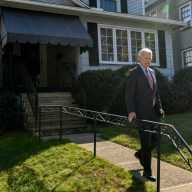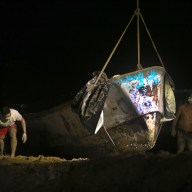KABUL – Major fraud complaints in the Afghan presidential election surged Sunday to nearly 700, raising concern that the volume of cases that must be investigated will delay announcement of a winner and formation of a new government.
President Hamid Karzai is leading with 46.2 per cent of votes from the Aug. 20 ballot, followed by ex-Foreign Minister Abdullah Abdullah with 31.4 per cent, according to official figures from 35 per cent of the polling stations. Karzai must win over half the votes to avoid a run-off.
Final results cannot be certified until the election complaint commission finishes investigating all major fraud allegations. Officials had hoped to release the final tally by Sept. 17, but the huge number of complaints makes that unlikely.
The commission said Sunday it had received 691 “Category A” fraud allegations – more than double the 270 major complaints reported two days before.
Collectively, the complaints – if true – would cast doubt on the legitimacy of the election, dashing Obama administration hopes that the balloting would produce a credible government capable of confronting the Taliban threat, corruption and the flourishing narcotics trade.
A spokeswoman for the complaints commission, Nellika Little, said in all, 2,096 allegations of fraud and voter intimidation had been received. The commission is still evaluating those complaints and the number of those deemed major could rise, she said.
Such a large number of fraud allegations has raised concern whether Afghans will accept the final results. Abdullah has accused Karzai of using state resources to rig the vote and has ruled out an alliance if the incumbent wins. Election day was also marred by low turnout as well as Taliban threats and attacks.
Several presidential candidates have levelled accusations of fraud, including allegations that electoral officials forced voters to cast ballots for certain candidates and marked unused ballots after the balloting was over.
Karzai’s campaign has denied that and countered by accusing Abdullah’s campaign of fraud. Both camps have urged the country to wait for the complaints commission to finish its work.
An American member of the election complaint commission, Scott Worden, said the Sept. 17 date for releasing the final tally was not a legal deadline.
“Our first priority is being thorough and making sure we have resolved all the complains that could affect the outcome in a comprehensive way,” he said.
The head of an Afghan group that monitored the balloting said the complaints commission may not have enough staff to investigate the allegations quickly.
“I think the time is a difficulty,” said Nader Nadery of the Free and Fair Elections Foundation of Afghanistan. “I hope that the time issue is addressed through more human resources that they would put in place.”
Nadery said his organization documented cases of underage voting and Afghan men trying to cast multiple ballots supposedly on behalf of men and women who couldn’t make it to the polling station – all prohibited acts.
Observers also saw widespread examples of poll workers trying to sway the vote either by telling them to cast ballots for a specific candidate, or by stuffing ballot boxes, Nadery said. He said his group has videos and pictures of fraud.
Fraud allegations were also raised against Karzai in the 2004 election. A joint U.N.-Afghan panel found many cases of ballot-box stuffing, but said there was no evidence it was widespread or only favoured Karzai. Karzai received 55.4 per cent of the votes in the 2004 election – 39 percentage points ahead of his closest challenger.
Polls in the run-up to the vote showed Karzai leading but falling short of the 50 per cent mark needed to avoid a run-off. Karzai’s popularity has waned in recent years because of public disenchantment over corruption and ineffective government.
Karzai’s international supporters have complained of weak leadership, corruption and the president’s alliances with former warlords in an effort to win the votes they control.
Shortly before the election, Uzbek warlord Gen. Abdul Rashid Dostum, allegedly responsible for the deaths of up to 2,000 Taliban prisoners early in the Afghan war, returned from exile in Turkey to throw his support to Karzai. Dostum returned to Turkey late last week, his spokesman Sayed Noorullah Sadat said.
The election was held against the backdrop of rising violence, especially in the south where Taliban influence is greatest.
On Sunday, gunmen on motorbikes shot the second-ranking electoral official in the southern province of Kandahar province, Sharafuddin, as he walked through his front gate on his way to work, said Mohammad Samimi, a spokesman for the provincial electoral commission.
Sharafuddin, who used only one name, was rushed to a military hospital with serious wounds, the spokesman said.
Elsewhere, militants killed a provincial counterterrorism chief in an ambush Saturday in eastern Afghanistan, officials said. Three civilians were also killed in a roadside bomb blast Sunday in the south.
The U.S. military reported that about three dozen militants were killed Friday in a daylong battle with U.S. and Afghan forces in eastern Paktika province.
–
Associated Press Writers Rahim Faiez and Amir Shah in Kabul and Noor Khan in Kandahar contributed to this report.













